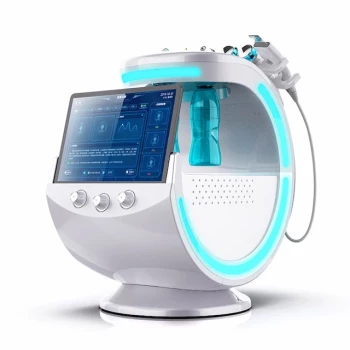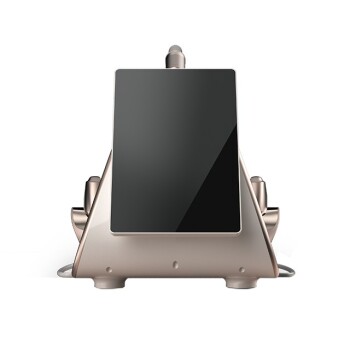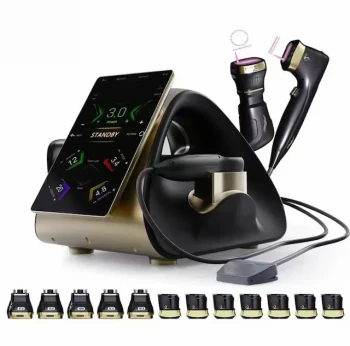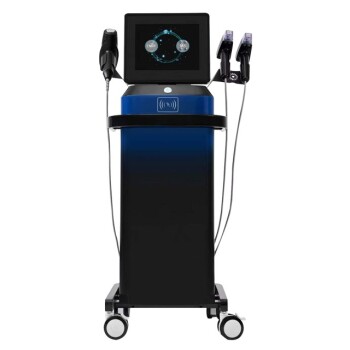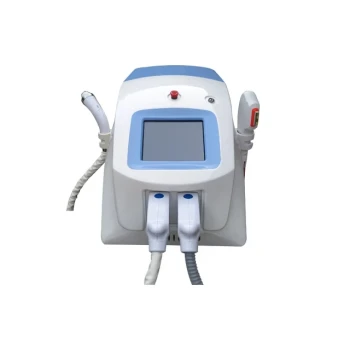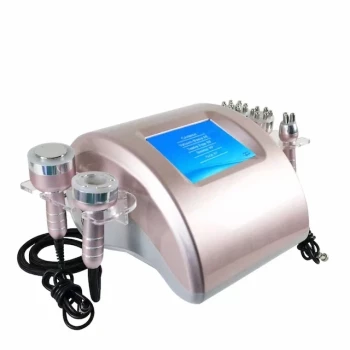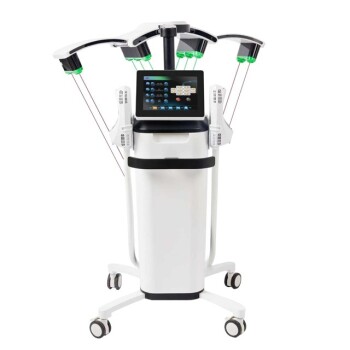In short, a HydraFacial is not suitable for individuals with active rashes, sunburns, or certain inflammatory skin conditions like moderate-to-severe eczema or psoriasis. The treatment's use of exfoliation and suction can easily exacerbate these issues, leading to further irritation and compromising an already fragile skin barrier.
While known for its gentle approach, the core mechanisms of a HydraFacial—exfoliation, suction, and active serums—make it inappropriate for skin that is actively inflamed, infected, or has a compromised barrier. The goal is to improve the skin, not trigger a flare-up.
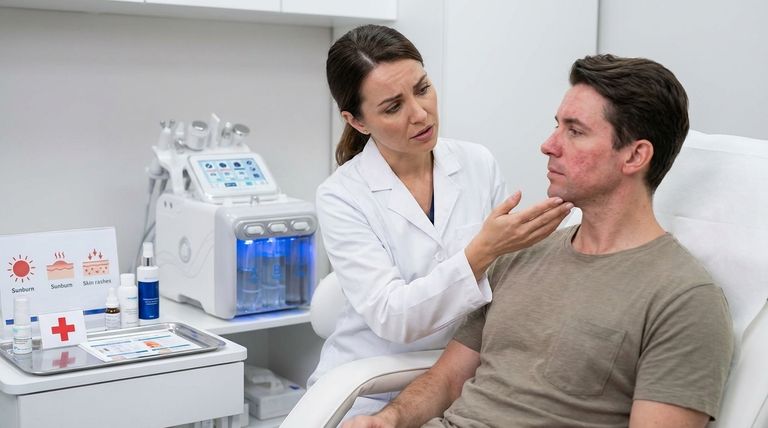
Why a "Gentle" Treatment Can Still Pose Risks
To understand who should avoid a HydraFacial, you must first understand how it works. The treatment involves a multi-step process that, while generally safe, is still an active intervention on your skin's surface.
The Role of Active Exfoliation
A HydraFacial uses both physical exfoliation from the tip of the device and chemical exfoliation from serums containing ingredients like glycolic and salicylic acid.
For skin that is already inflamed from a condition like eczema, this level of exfoliation can strip away a skin barrier that is already struggling, leading to increased redness, sensitivity, and potential flare-ups.
The Impact of Vortex Suction
A key feature of the HydraFacial is its vortex-like suction, which deeply cleanses pores by pulling out debris.
While effective on healthy skin, this vacuum force can be too aggressive for skin experiencing active inflammation, cystic acne, or a condition like severe rosacea. It can cause further irritation or even spread bacteria in the case of active lesions.
The Introduction of Active Serums
The final steps involve infusing the skin with serums. While beneficial, these serums contain active ingredients.
If you have a known allergy to common skincare ingredients (like salicylic acid, which is related to aspirin) or specific botanicals, you could have an adverse reaction.
Key Contraindications: A Detailed Look
Certain conditions and circumstances serve as clear signals to postpone or avoid a HydraFacial treatment entirely. A professional consultation is the only way to be certain, but these are the primary concerns.
Chronic Inflammatory Skin Conditions
As noted, conditions like eczema and psoriasis are significant contraindications. These autoimmune-related conditions weaken the skin barrier, and a HydraFacial is highly likely to trigger a flare-up and worsen the condition.
Active Infections, Rashes, and Lesions
You should never perform a HydraFacial over any active skin infection. This includes cold sores (herpes simplex virus), warts, impetigo, or even severe, open cystic acne. The treatment can easily spread the virus or bacteria across the face. The same applies to any undiagnosed rash.
Sunburn or Recently Compromised Skin
Sunburned skin is damaged, inflamed, and in a state of repair. Subjecting it to the exfoliation and suction of a HydraFacial would be painful and would cause significant further damage, delaying healing. This also applies to skin post-procedure, such as after a recent laser treatment or deep chemical peel.
Use of Specific Medications
The most well-known contraindication is the use of isotretinoin (Accutane). You must be off this medication for at least six months before a HydraFacial due to its profound effect on skin sensitivity and healing. Use of topical retinoids like Tretinoin or strong exfoliants may also require you to pause usage for several days before and after treatment.
Specific Allergies
If you have a known allergy to aspirin, you should avoid treatments containing salicylic acid. Likewise, an allergy to shellfish can be a contraindication for some serums, as certain ingredients may be derived from them. Always disclose all allergies to your provider.
Understanding the Cautions and Relative Risks
Beyond the absolute "no's," there are "gray areas" where suitability depends entirely on the individual's skin, the severity of the condition, and the skill of the provider.
The "Gray Area": Sensitive Skin
Having generally "sensitive" skin does not automatically disqualify you. A skilled provider can adjust the suction level and choose milder serums. However, a patch test is highly recommended to gauge how your skin will react.
Rosacea: A Case-by-Case Basis
Rosacea is a complex condition. If you are experiencing an active, inflammatory flare-up with pustules and significant redness, a HydraFacial should be avoided. However, for those with mild, non-inflamed rosacea, a customized HydraFacial can sometimes help by gently hydrating the skin, but this must be determined by an expert.
The Critical Role of Your Provider
A pre-treatment consultation with a licensed and experienced esthetician or dermatologist is non-negotiable. They are trained to assess your skin, understand your health history, and determine if a HydraFacial is a safe and beneficial choice for you. Full disclosure on your part is essential for your safety.
Making the Right Decision for Your Skin
Always prioritize skin health and safety over any single treatment. A consultation with a qualified professional is the most important step.
- If you have an active rash, sunburn, or infection: You must postpone the treatment until your skin is fully healed and the condition is resolved.
- If you have a chronic condition like eczema or psoriasis: Consult your dermatologist before considering a HydraFacial, as the risk of triggering a flare-up is significant.
- If you are using potent medications like Accutane or prescription retinoids: You must disclose this to your provider and follow their specific guidelines on pausing use.
- If you simply have sensitive skin or mild rosacea: Request a thorough consultation and a patch test to ensure the treatment can be customized for your tolerance.
Ultimately, an informed decision made in partnership with a skin health professional is the only way to ensure a safe and positive outcome.
Summary Table:
| Condition/Scenario | Reason to Avoid/Pause Treatment |
|---|---|
| Active Eczema/Psoriasis | Exfoliation & suction can trigger flare-ups and damage a compromised skin barrier. |
| Active Infections (e.g., cold sores, warts) | Treatment can spread bacteria or virus across the face. |
| Recent Sunburn | Skin is inflamed and healing; exfoliation/suction causes further damage. |
| Use of Isotretinoin (Accutane) | Increases skin sensitivity; wait at least 6 months after stopping medication. |
| Known Allergies (e.g., aspirin, shellfish) | Serums may contain allergens like salicylic acid or marine-derived ingredients. |
| Severe Rosacea Flare-up | Suction and active serums can worsen inflammation and redness. |
Ensure safe and effective treatments for your clients with professional-grade equipment from BELIS.
As a specialist in medical aesthetic equipment for clinics and premium beauty salons, BELIS provides devices that support precise, customizable treatments—helping you deliver optimal results while prioritizing client safety.
Contact our experts today to learn how our solutions can enhance your service offerings and build client trust.
Visual Guide
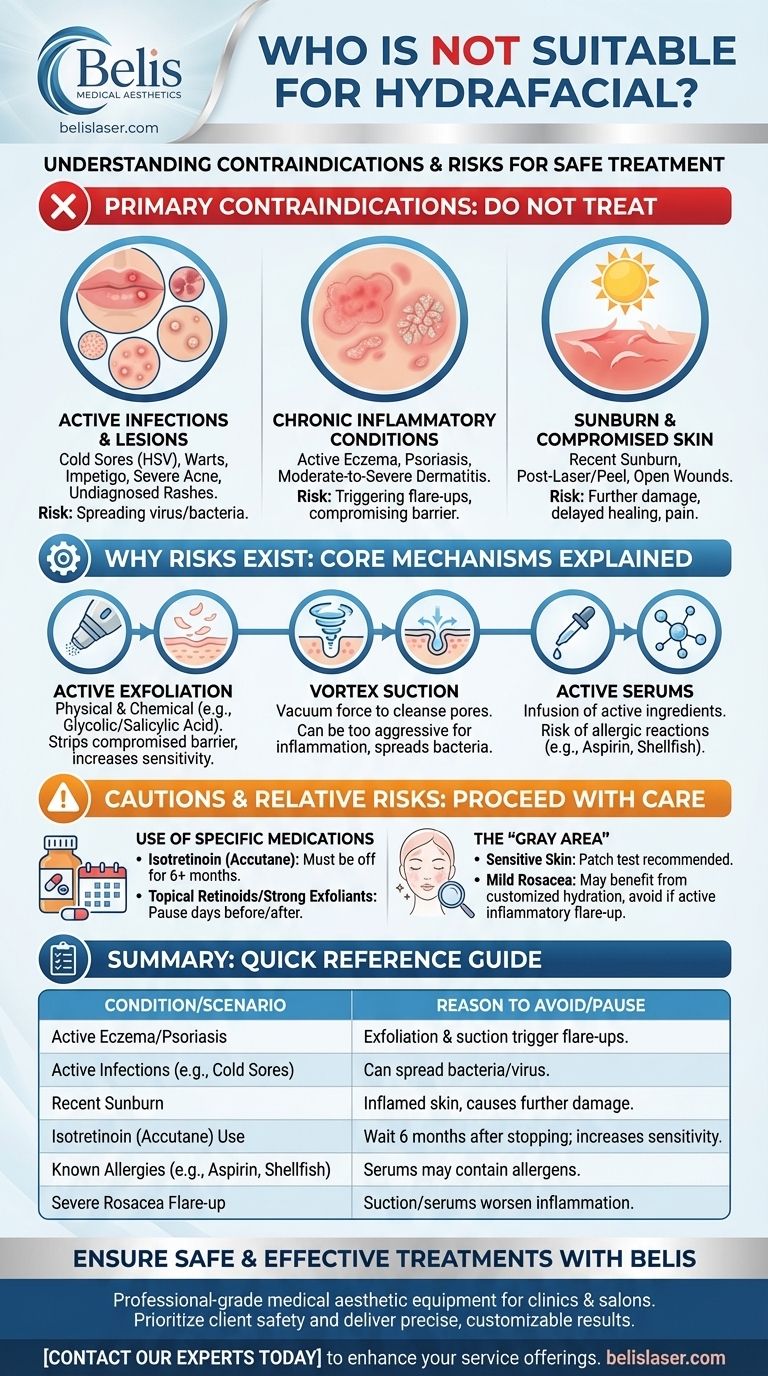
Related Products
- Hydrafacial Machine Facial Clean Face and Skin Care Machine
- Hydrofacial Machine with Facial Skin Analyzer and Skin Tester
- Hydrafacial Machine with Facial Skin Analyzer Skin Tester
- 4D 12D HIFU Machine Device for Skin Tightening and Lifting
- 4D 12D HIFU Machine Device for Skin Tightening
People Also Ask
- How long is a typical HydraFacial session and how long do the effects last? Get Instant Glow & Lasting Skin Health
- In what way does a HydraFacial reduce fine lines and wrinkles? Unlock the Secret to Youthful, Plumped Skin
- What are the contraindications for a HydroFacial treatment? Essential Safety Guide for Clinics & Salons
- How does a Hydrafacial system achieve the synergy of deep cleaning and nutrient delivery? Mastering Vortex Technology
- What is the role of Hydrafacial systems in postoperative care? Accelerate Healing for Optimal Aesthetic Results
- What skin conditions can a hydro-dermabrasion facial help improve? Reveal Radiant, Clear, and Hydrated Skin
- What are the four main steps of a HydraFacial treatment? Unlock Radiant, Deeply Hydrated Skin with This 4-Step Guide
- How does a HydraFacial improve uneven skin tone and texture? Secrets to a Polished, Radiant Glow


